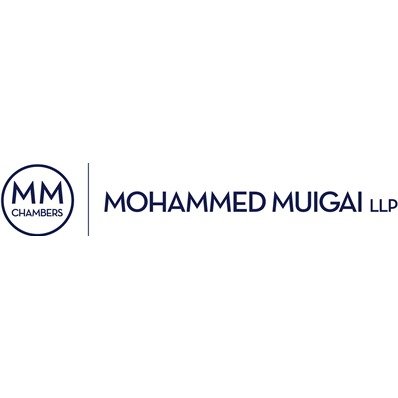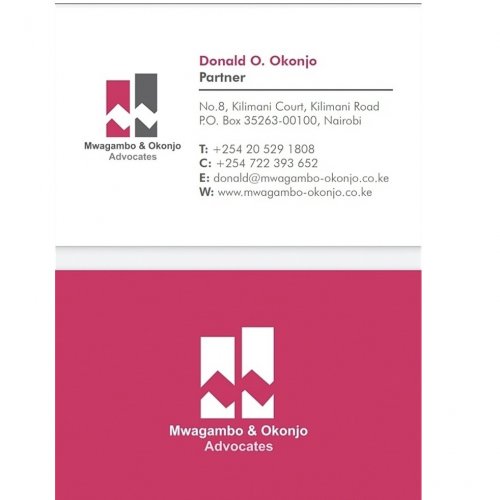Best Restructuring & Insolvency Lawyers in Nairobi
Share your needs with us, get contacted by law firms.
Free. Takes 2 min.
List of the best lawyers in Nairobi, Kenya
Legal guides written by Adroit Law LLP:
- Kenya Launches Digital Nomad Visa: A Gateway for Remote Workers
- Navigating the Payment System License Maze in Kenya
- Navigating the Complexities of Mining Licenses and Permits in Kenya: A Look into Artisanal and Large-Scale Operations
About Restructuring & Insolvency Law in Nairobi, Kenya
Restructuring and insolvency law in Nairobi, Kenya, concerns the legal processes businesses and individuals can use when facing financial distress or unmanageable debts. Restructuring involves arrangements that might allow a business to continue operating while reorganizing its financial affairs. Insolvency, on the other hand, arises when a person or a corporation is unable to pay their debts as they become due. Kenyan law offers formal procedures for dealing with such situations, aiming to protect the interests of both creditors and debtors while promoting economic stability and fairness.
Why You May Need a Lawyer
You may require a lawyer for restructuring and insolvency matters in several scenarios. If you are a business owner struggling to meet ongoing financial obligations, a lawyer can help you understand your options, whether that means negotiating with creditors or initiating a formal restructuring process. Creditors may also need legal assistance to recover debts lawfully in insolvency proceedings. Individuals facing personal insolvency, including bankruptcy, should seek legal advice to navigate the process and protect their rights. Lawyers can also play an essential role in preventing potential legal pitfalls and ensuring compliance with relevant laws throughout the restructuring or insolvency journey.
Local Laws Overview
Restructuring and insolvency law in Nairobi is governed mainly by the Insolvency Act, 2015, as well as several related statutes and regulations. Some of the key aspects include:
- The Insolvency Act provides procedures for both companies and individuals regarding bankruptcy, liquidation, administration, and voluntary arrangements.
- Corporate insolvency options include liquidation, voluntary administration, and company voluntary arrangements, allowing entities to propose payment plans or restructuring to avoid outright liquidation when possible.
- Personal insolvency processes, such as bankruptcy, offer mechanisms for individuals to manage and settle debts lawfully while providing certain protections against creditor harassment.
- Creditors may apply to have a debtor company or individual declared insolvent through the courts if thresholds are met.
- Administrators, liquidators, and trustees are licensed professionals responsible for carrying out formal insolvency processes under court supervision or creditor oversight.
- The law requires public notification of most formal insolvency proceedings and provides for its regulation through court orders and the Office of the Official Receiver.
- Recent legal reforms have aimed at modernizing insolvency law to make it more creditor-friendly while maintaining fair treatment for debtors and employees.
Frequently Asked Questions
What is corporate restructuring?
Corporate restructuring is a process where a company reorganizes its financial or operational structure, often to improve efficiency, reduce debt, or avoid insolvency. This might include renegotiating debts, changing management, merging with another business, or selling assets.
What is the difference between bankruptcy and liquidation?
Bankruptcy normally refers to an individual being legally declared unable to pay their debts. Liquidation involves winding up a company so that its assets are sold off to pay creditors.
Who can initiate insolvency proceedings in Nairobi?
Typically, insolvency proceedings can be initiated by the debtor (the individual or company facing financial hardship) or by creditors, usually after certain legal thresholds and procedures have been followed.
What is an Official Receiver, and what is their role?
The Official Receiver is an officer appointed by the government to oversee and administer insolvency proceedings, ensuring that the law is followed and the interests of both creditors and debtors are protected.
How long do insolvency proceedings usually take in Kenya?
The duration varies widely depending on the case's complexity. Simple bankruptcy or liquidation cases can be resolved in several months, whereas more complicated corporate restructurings can take years to complete.
Can I keep any assets if I am declared bankrupt?
Certain assets may be exempt from bankruptcy proceedings, such as tools of trade or essential household items, but this is subject to legal limits and the specifics of the case.
Are employee salaries protected during company insolvency?
Kenyan law gives priority to outstanding employee wages when a company is liquidated. Employees are considered preferential creditors and should be paid before unsecured creditors.
What are my options if my company is facing insolvency?
Options may include voluntary administration, company voluntary arrangements with creditors, or liquidation. Seeking legal guidance early can help identify the best path forward.
Can creditors still pursue me after bankruptcy or liquidation?
Once a bankruptcy or liquidation order is in place, creditors are usually prevented from taking separate actions to recover debts, subject to certain exceptions under the law.
Do I always need to go to court for restructuring and insolvency matters?
Not always. Some arrangements can be handled out of court, especially informal restructurings or voluntary settlements. However, formal insolvency and restructuring procedures are overseen by the courts.
Additional Resources
If you are seeking assistance or more information about restructuring and insolvency in Nairobi, the following resources can be helpful:
- Office of the Official Receiver - The main regulatory authority for insolvency matters in Kenya.
- Kenya Law Reports - For updated statutes, legal cases, and government notices related to insolvency.
- Insolvency Practitioners Association of Kenya - Professional body for licensed insolvency practitioners and administrators.
- Law Society of Kenya - To find qualified lawyers specializing in restructuring and insolvency law.
- Business advisory centers and financial counselors for preliminary guidance before seeking formal legal steps.
Next Steps
If you believe you are facing a restructuring or insolvency issue in Nairobi, it is advisable to:
- Gather all relevant financial documents, such as contracts, loan agreements, and statements of assets and liabilities.
- Consult with a licensed lawyer or insolvency practitioner who specializes in restructuring and insolvency for a confidential assessment of your circumstances.
- Assess whether informal negotiations are possible or whether formal legal proceedings are necessary.
- Understand your rights and obligations under Kenyan law to avoid mistakes that could worsen your financial or legal situation.
- Follow your lawyer's advice on the next procedural steps, whether that involves negotiation, court application, or other legal remedies available to you.
Acting quickly and seeking professional guidance early can significantly improve your options and help you achieve the best possible outcome in any restructuring or insolvency scenario.
Lawzana helps you find the best lawyers and law firms in Nairobi through a curated and pre-screened list of qualified legal professionals. Our platform offers rankings and detailed profiles of attorneys and law firms, allowing you to compare based on practice areas, including Restructuring & Insolvency, experience, and client feedback.
Each profile includes a description of the firm's areas of practice, client reviews, team members and partners, year of establishment, spoken languages, office locations, contact information, social media presence, and any published articles or resources. Most firms on our platform speak English and are experienced in both local and international legal matters.
Get a quote from top-rated law firms in Nairobi, Kenya — quickly, securely, and without unnecessary hassle.
Disclaimer:
The information provided on this page is for general informational purposes only and does not constitute legal advice. While we strive to ensure the accuracy and relevance of the content, legal information may change over time, and interpretations of the law can vary. You should always consult with a qualified legal professional for advice specific to your situation.
We disclaim all liability for actions taken or not taken based on the content of this page. If you believe any information is incorrect or outdated, please contact us, and we will review and update it where appropriate.

















